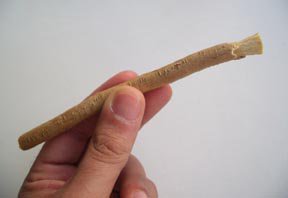Allah, Most High, has repeatedly made reference to the gift of fruit in the Holy Quran.
In one verse Allah, Most High, says:
“Do you not see that Allah sends down rain from the sky, and we produce therewith fruits of various colours.” (Surah Fatir: 87)
Elsewhere Allah, Most High, says:
“and He sent down rain from the sky and brought forth fruits as provision for you.” (Surah Baqarah: 22)
Gratitude for all Bounties
Fruits and vegetables are great bounties of Allah, Most High, upon the creation. Some provide nourishment and others are a source of satisfaction and refreshment. As Muslims, we have been taught in the Quran and Hadith to be thankful to Allah, Most High, -our Sole Sustainer- for every minute bounty of His. It is only becoming of a true believer that he remembers his creator during times of enjoyment and happiness just as he turns to Almighty Allah in the times of difficulty and distress.
The practice of Rasulullah (Allah bless him and grant him peace) at the time of receiving the first fruit of the season was that he would firstly show the utmost respect for it, he would then recite a supplication to Allah, Most High. Thereafter he would not partake of it himself; instead he would give it to any child that was present.
Sayyiduna Abu Hurairah (Allah be well pleased with him), Sayyiduna ibn ‘Abbas (Allah be well pleased with them both), Sayyiduna Anas (Allah be well pleased with him) and Sayyidatuna Aishah (Allah be well pleased with her) have all reported that when the first fruit of the season used to be brought to Rasulullah (Allah bless him and grant him peace) he would kiss it, touch it to his eyes, recite the following du’a and then give it to the smallest child that was in his presence:
اللهُم كَمَا أَرَيْتَنا أَولَه أَرِنا آخِرَه
“Allahumma kama araytana awwalahu, arina akhirahu”
Translation: O Allah! just as You have shown us the first of it, allow us to see the last of it.
References: These narrations have been recorded by Imams: Abu Dawud in his Kitabul Maraseel, Hadith: 475-476 Ibnus Sunni, Hadith: 280, Tabarani in Al-Mu’jamus Saghir, vol. 2 pg. 11 & in his Kitabud Du’a, Hadith: 2004-2005.
‘Allamah Haithami (Allah grant him mercy) has declared the narration of Al-Mu’jamus Saghir as sahih (authentic).
Explanation
The reason for giving it to the child is either because of the similarity between the two that both are new in the world or because of the extreme joy that a child experiences through this. (Al-Futuhatur Rabbaniyyah, vol. 6 pg. 235-236)
Hafiz ibn ‘Allan (Allah grant him mercy) mentions that the reason for Rasulullah (Allah bless him and grant him peace) kissing the fruit and touching it to his eyes is because it has been newly created by Almighty Allah. Just as Rasulullah (Allah bless him and grant him peace) used to go out in the rain and open his chest (so the rain may touch him) and he would say: “Verily it (the raindrops) have only recently arrived from my Lord!” (Sahih Muslim, Hadith: 2080)
The following Du’a has also been authentically recorded to have been recited by Rasulullah (Allah bless him and grant him peace) upon sighting the first fruit of the season:
اللهم بَارِكْ لَنَا فِيْ ثمرنا، وبَارِكْ لَنَا فِيْ مدينتنا، وبَارِكْ لَنَا فِيْ صاعنا، و بَارِكْ لَنَا فِيْ مدنا
“Allahumma Bariklana fi thamarina, wa Bariklana fi Madinatina, wa Bariklana fi saw’ina, wa Bariklana fi Muddina”
Translation: O Allah! Grant us Barakah (blessings) in our fruit, grant us Barakah in our town, grant us Barakah in our food that is measured and grant us Barakah in our food that is weighed. (Sahih Muslim, Hadith: 1373)
The Sahabah (Allah be well pleased with them) would bring the first produce of their orchards to Rasulullah (Allah bless him and grant him peace). Many people today emulate that in a way by presenting their first produce to their teachers, seniors etc.
Selected Fruits
The following are among the fruits that Rasulullah (Allah bless him and grant him peace) is reported to have consumed in his lifetime:
- Fresh dates
- Dry dates
- Grapes – Rasulullah (Allah bless him and grant him peace) would enjoy grapes.
- Raisins
- Pomegranates – Sayyidunna Abdullah ibn ‘Abbas (Allah be well pleased with them both) is reported to have commented that in each pomegranate there is a seed from Jannah. (Majma’uz Zawaid, vol. 5 pg. 45) In fact, the Quran states that pomegranates will be among the fruit of Jannah. (Surah Ar-Rahman: 68)
- Cucumbers – Rasulullah (Allah bless him and grant him peace) would relish this. He would at times prefer to have it with a bit of salt.
- Melons – Melons as well as fresh dates are reported to be from the most beloved of fruits to Rasulullah (Allah bless him and grant him peace)
For on the above list refer to Subulul Huda war Rashad (vol. 7 pgs. 204-209).
Conclusion
Each season of the year brings its own fruits. Let’s implement the above Sunnah and turn these bounties of Allah, Most High, into “Blessed Fruits”
Source: https://muslimvillage.com
Post Disclaimer | Support Us
Support Us
The sailanmuslim.com web site entirely supported by individual donors and well wishers. If you regularly visit this site and wish to show your appreciation, or if you wish to see further development of sailanmuslim.com, please donate us
IMPORTANT : All content hosted on sailanmuslim.com is solely for non-commercial purposes and with the permission of original copyright holders. Any other use of the hosted content, such as for financial gain, requires express approval from the copyright owners.
 Sri lanka Muslims Web Portal Sri Lanka Muslims News Center
Sri lanka Muslims Web Portal Sri Lanka Muslims News Center
 Donate
Donate


